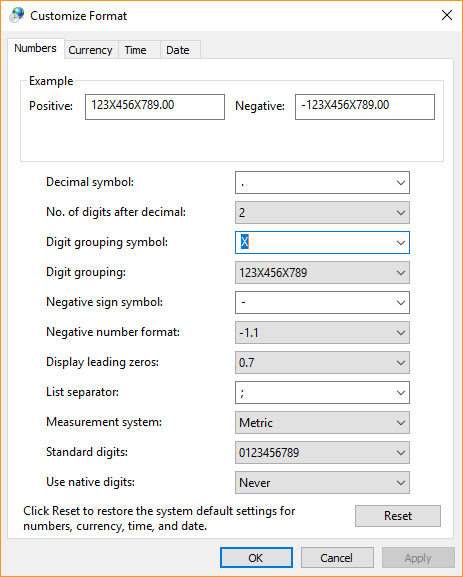The problem
The problem started with a simple code:
double.TryParse("1'000", NumberStyles.Any, culture, out _)
Be aware that the given culture was “DE-CH” and the Swiss use the ‘ for the separator for numbers.
Unfortunately the Swiss authorities have abandoned the ‘ for currencies, but it is widly used in the industrie and such a number should be parsed or displayed.
Now Microsoft steps in and they use a very similar char in the “DE-CH” region setting:
- The backed in char to separate numbers: ‘ (CharCode: 8217)
- The obvious choice would be: ‘ (CharCode: 39)
The result of this configuration hell:
If you don’t change the region settings in Windows you can’t parse doubles with this fancy group separator.
Stranger things:
My work machine is running the EN-US version of Windows and my tests where failing because of this madness, but it was even stranger: Some other tests (quite similar to what I did) were OK on our company DE-CH machines.
But… why?
After some crazy time I discovered that our company DE-CH machines (and the machines from our customer) were using the “sane” group separator, but my code still didn’t work as expected.
Root cause
The root problem (besides the stupid char choice) was this: I used the “wrong” method to get the “DE-CH” culture in my code.
Let’s try out this demo code:
class Program
{
static void Main(string[] args)
{
var culture = new CultureInfo("de-CH");
Console.WriteLine("de-CH Group Separator");
Console.WriteLine(
$"{culture.NumberFormat.CurrencyGroupSeparator} - CharCode: {(int) char.Parse(culture.NumberFormat.CurrencyGroupSeparator)}");
Console.WriteLine(
$"{culture.NumberFormat.NumberGroupSeparator} - CharCode: {(int) char.Parse(culture.NumberFormat.NumberGroupSeparator)}");
var cultureFromFramework = CultureInfo.GetCultureInfo("de-CH");
Console.WriteLine("de-CH Group Separator from Framework");
Console.WriteLine(
$"{cultureFromFramework.NumberFormat.CurrencyGroupSeparator} - CharCode: {(int)char.Parse(cultureFromFramework.NumberFormat.CurrencyGroupSeparator)}");
Console.WriteLine(
$"{cultureFromFramework.NumberFormat.NumberGroupSeparator} - CharCode: {(int)char.Parse(cultureFromFramework.NumberFormat.NumberGroupSeparator)}");
}
}
The result should be something like this:
de-CH Group Separator
' - CharCode: 8217
' - CharCode: 8217
de-CH Group Separator from Framework
' - CharCode: 8217
' - CharCode: 8217
Now change the region setting for de-CH and see what happens:

de-CH Group Separator
' - CharCode: 8217
X - CharCode: 88
de-CH Group Separator from Framework
' - CharCode: 8217
' - CharCode: 8217
Only the CultureInfo from the first instance got the change!
Modified vs. read-only
The problem can be summerized with: RTFM!
From the MSDN for GetCultureInfo: Retrieves a cached, read-only instance of a culture.
The “new CultureInfo” constructor will pick up the changed settings from Windows.
TL;DR:
- CultureInfo.GetCultureInfo will return a “backed in” culture, which might be very fast, but doesn’t respect user changes.
- If you need to use the modified values from windows: Use the normal CultureInfo constructor.
Hope this helps!